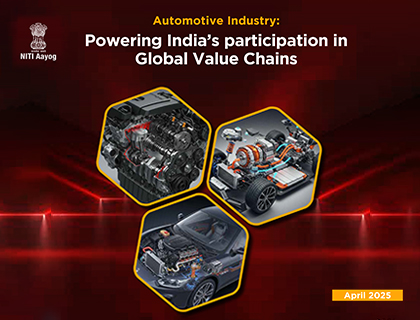India’s Automotive Industry and Global Value Chains

- 14 Apr 2025
In News:
NITI Aayog has recently released a comprehensive report titled “Automotive Industry: Powering India’s Participation in Global Value Chains”. It offers a roadmap to boost India’s role in the global automotive sector by enhancing competitiveness, production capacity, and export potential.
India’s Current Position
India is the world’s fourth-largest automobile producer, with nearly 6 million vehicles manufactured annually. However, its share in the global automotive component trade remains modest at 3%, primarily due to limited penetration in high-precision segments like engine components and drive transmission systems. The country exports auto components worth $20 billion, with major strengths in small cars and utility vehicles.
Global Landscape and Emerging Trends
Globally, 94 million vehicles were produced in 2023, with the automotive components market valued at $2 trillion, of which $700 billion was exported. The industry is witnessing rapid transformation through:
- Electric Vehicles (EVs): Rising demand, regulatory shifts, and battery innovations are reshaping manufacturing.
- Battery Ecosystems: Hubs in Europe and the US are altering global supply chains, focusing on lithium and cobalt.
- Industry 4.0: AI, IoT, robotics, and machine learning are revolutionizing automotive manufacturing through smart factories and digital supply chains.
Challenges to India’s GVC Participation
Despite a strong production base, India faces several hurdles in climbing the Global Value Chain (GVC):
- Low R&D spending and limited innovation
- High operational costs and infrastructural gaps
- Weak IP ecosystem and low brand visibility
- Inadequate skilling and moderate digital adoption
Strategic Interventions Proposed
NITI Aayog recommends a combination of fiscal and non-fiscal measures to address these gaps and strengthen India’s automotive ecosystem.
Fiscal Measures:
- Opex support to scale up production and infrastructure
- Skilling initiatives to build a trained workforce
- R&D incentives and IP transfer support for MSMEs
- Cluster development for shared R&D and testing facilities
Non-Fiscal Measures:
- Promoting Industry 4.0 adoption and quality manufacturing
- Ease of Doing Business reforms in labour, logistics, and regulations
- Global tie-ups and Free Trade Agreements (FTAs) to boost exports
Vision for 2030
By 2030, the report envisions:
- Auto component production to grow from ~$60 billion to $145 billion
- Exports to increase from $20 billion to $60 billion
- GVC share to rise from 3% to 8%
- Trade surplus of around $25 billion
- Employment generation of 2–2.5 million additional jobs
